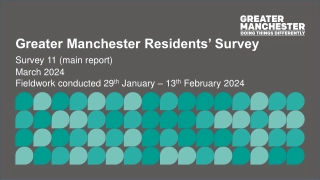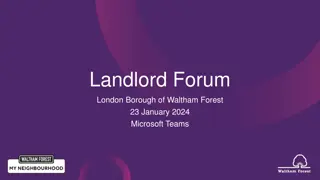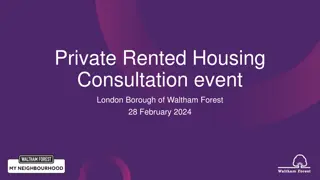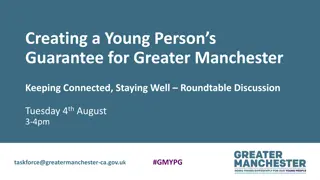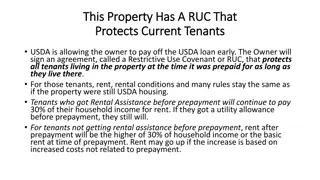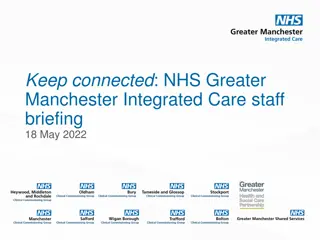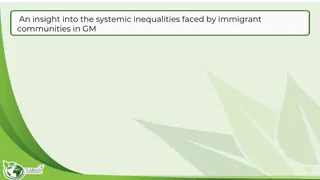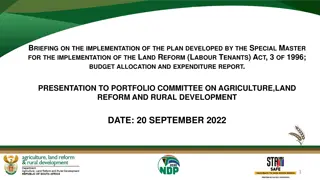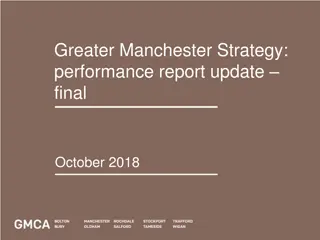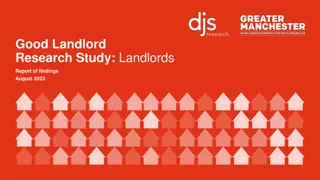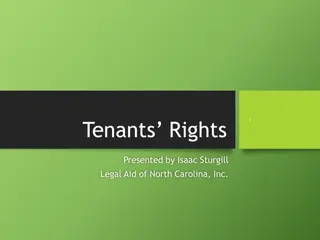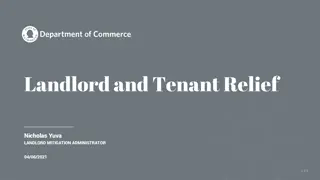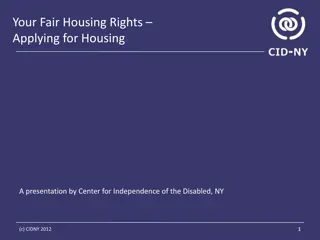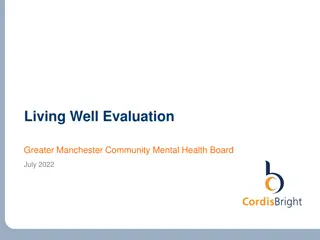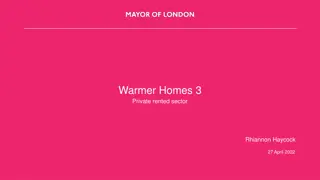Insights from Good Landlord Research Study: Tenants' Experiences in Greater Manchester's Private Rented Sector
Private tenants in Greater Manchester were surveyed to understand their rental experiences, challenges, and aspirations. The study found that a high percentage of tenants have either moved or considered moving in the last five years, highlighting the dynamic nature of the rental market in the region.
Download Presentation

Please find below an Image/Link to download the presentation.
The content on the website is provided AS IS for your information and personal use only. It may not be sold, licensed, or shared on other websites without obtaining consent from the author. Download presentation by click this link. If you encounter any issues during the download, it is possible that the publisher has removed the file from their server.
E N D
Presentation Transcript
Good Landlord Research Study: Tenants Report of findings August 2023 1
Contents 3 Background & objectives 4-6 Methodology & reporting 7-12 Summary & Recommendations Main Findings 13 - 16 Tenant Characteristics 17 - 19 Finances & rent 20 - 24 motivations & experience Tenants followed by landlords 25 30 Looking for properties and tenants 31 35 Property management 36 - 39 problems experienced 40 46 Overall satisfaction 47 50 What is a good landlord? 2
Background & objectives To inform the development of a new Good Landlord Charter GMCA wanted to survey private tenants in Greater Manchester to understand their experiences of renting a property in the private rented sector (PRS). The main objectives of the research are to: Identify the characteristics of private tenants in Greater Manchester (GM) Explore the motives and aspirations of tenants Understand experiences of renting properties Assess challenges in relation to affordability and cost of living in the private rented sector Explore how private renting can be improved 3
Methodology Survey designed by DJS Research, in collaboration with GMCA, covering the topics listed on the following page. A mix of online and offline research methods were used to ensure the sample was inclusive and representative: telephone interviews and online surveys (promoted via social media and using GMCA networks), plus online panels and face-to- face/in-street interviews among tenants. Fieldwork dates: Started on 15th Feb 2023 All fieldwork paused from 27th March until 5th May due to local elections. Fieldwork then continued until 11th June. In total a sample of 1,200 tenants was achieved. Tenants data has been weighted to ensure it is representative of the GM private rented sector by age, gender and district. 4
Topics covered by the surveys Tenants Tenant characteristics (inc. ethnicity, disability & sexual orientation) Tenancy length and details Satisfaction with property, landlord & private renting overall Looking for rental properties (e.g. ease of finding a rental property) Problems experienced Finances/rent What makes a good landlord 5
Summary 6
Summary (I) Three-quarters of tenants stated they have moved home at least once within the last 5 years and of those who haven t, half have looked to move. In total this means 9 in 10 tenants have either moved or looked to move in the last 5 years. These findings are consistent with the English Housing Survey** which found private renters were the most likely tenure to have been living in their home for less than 3 years. Tenant Characteristics The survey of 1200 private tenants within Greater Manchester (GM) was undertaken with a representative sample, which confirmed that private tenants in GM are generally young, diverse and transient. The survey also found that most tenants are not privately renting out of choice: Weighted by age, gender and district to reflect the latest population statistics* the survey data confirmed that half of private tenants in GM are aged 16-34 years. The proportion of respondents in the survey with a disability was higher than compared with the population data, at 1 in 4. Consistent with the population data, a similar proportion of survey respondents (1 in 4) are from minority ethnic groups. Most (4 in 5) tenants surveyed live in deprived communities (IMD 1 or 2) and the proportion that receive housing benefits (3 in 10) reflects the population. Conversely around 1 in 20 live in the least deprived communities of GM (IMD 5). Just 1 in 4 tenants from the survey said that renting is a positive choice for them. Two-thirds are forced to live in the PRS due to not being able to own a home or access social housing. Financial concerns A third of tenants said they are struggling to pay their rent and this proportion increases significantly among those not in work/unemployed, working part-time or claiming housing benefits; overall 1 in 5 cited their rent as a constant struggle. Two-thirds of all tenants surveyed agreed that it has become more difficult to pay their rent in the last 12 months. *Census 2021 **https://www.gov.uk/government/statistics/english-housing-survey-2021-to-2022-household-moves-fact-sheet/english-housing- survey-2021-to-2022-household-moves-fact-sheet 7
Summary (II) Finding properties Rental cost stands out as the factor considered most important when looking for a rental property among tenants, after some margin this is followed by property condition and the neighbourhood/feeling safe. Significant proportions of tenants from the survey reported difficulties and discrimination when finding properties to rent: Half said they experienced difficulties when they last looked for rental properties and the likelihood of this increased among females, tenants with a disability, those not in work and bisexual. Lack of availability, followed by poor property condition and then deposits being too expensive are the most common problems reported by tenants looking for properties in GM; at least half of all tenants surveyed had experienced each of these problems within the last 5 years. 6 in 10 tenants claiming housing benefits reported they have experienced discrimination when looking for properties in the last 5 years because of this. Significant minorities say they have experienced discrimination due to race, gender, sexual orientation or disability when looking for a rental property. More than 1 in 3 tenants surveyed said they had concerns about the landlord or letting agent when looking for properties. Value for money More than half of tenants are satisfied that their rent represents value for money; however, 1 in 4 are dissatisfied in this regard. Satisfaction with value for money declines as the amount of monthly rent paid increases and is lower than average among various groups of tenants, including those with a disability and tenants who are bisexual, gay or lesbian. 8
Summary (III) A high proportion of tenants have experienced maintenance issues recently and there seems to be some lack of knowledge as to who tenants should complain to when issues arise. Property maintenance and management The majority of tenants are also satisfied with property management and condition, however significant minorities are not and certain sub-groups again stand out as being less satisfied. Three-quarters of tenants have experienced a maintenance issue in their property within the last year, including 2 in 5 that have experienced damp/mould and nearly 1 in 3 a broken boiler/heating. Three-fifths of tenants are satisfied with how their property is managed overall, however 1 in 4 tenants are dissatisfied and the proportion is significantly higher among tenants with a disability or who are bisexual. When maintenance problems have been experienced, 2 in 5 tenants have been left dissatisfied with the outcome. The likelihood of this again increases significantly among certain groups, including those with a disability and tenants who are gay or lesbian. Tenants whose properties are managed directly by the landlord tend to be more satisfied with property management, than compared with tenants whose properties are managed by a letting agent or both the landlord and agent. Over half of tenants reported that they have ever experienced a problem or disagreement with a landlord or letting agent; poor/slow communication is the most common complaint. Two-thirds are satisfied with their property s condition, while 1 in 5 are dissatisfied. Dissatisfaction is higher among tenants who receive housing benefits and who have a disability. Two-fifths of all tenants and half of those who have experienced disagreements with a landlord or letting agent stated that they do not know who to complain to if they needed to. 9
Summary (IIII) CHAID analysis helps identify sub-groups to target when trying to improve tenant satisfaction. The analysis highlighted two groups where tenant satisfaction is particularly low: Tenants who constantly struggle to pay their rent AND have a disability AND rent because they can t access social housing (7%). Tenant who had experienced poor communication from their landlord/property manager AND broken electrics AND need for decoration (11%). In contrast, satisfaction is especially high among tenants who have experienced the opposite i.e. good communication AND no unexpected rent rises AND no damp/mould AND no damaged/broken white goods (87%). Overall satisfaction Overall, three-fifths of private tenants in GM are satisfied with living in the private rented sector, however just 1 in 5 are very satisfied . Satisfaction is higher when properties are managed solely by the landlord. A quarter of tenants are dissatisfied with living in the private rented sector and this increases significantly among tenants with a disability and those who are bisexual, gay or lesbian. Affordability tops the reasons given for tenant dissatisfaction, though many comments are coupled with poor living conditions and problems experienced with repairs, which confirms the need for a balance. Key driver analysis found that of a range of factors that drive tenant satisfaction, value for money of rent is the most significant, closely followed by the relationship tenants have with their landlord. Some tenants dissatisfied with living in the PRS comment that they feel scared and fear losing their home if they complain too much. Several tenants mention feeling trapped by living in rented accommodation. 10
Summary (V) Landlord accreditation and enforcement More than 8 in 10 tenants each think that stopping discrimination by landlords and improving property conditions should be legal requirements enforced by regulation and three-quarters think rent control should be enforced. Tenants are least likely to expect enforcement for giving tenants more power to stay in properties as long as they want or for allowing tenants more say over their homes (e.g. to decorate or have pets). The vast majority (8 in 10) of tenants say it would make at least some difference to their likelihood to rent a property if the landlord was accredited, for 2 in 5 it would make a big difference . When looking for a new property landlord accreditation is considered very/quite important by 6 in 10 tenants and 8 in 10 consider the professionalism of the landlord and the reputation of the landlord/agent important. When asked to select their top priorities for National Government and local councils to make or encourage landlords to do tenants are most likely to choose rent control, followed quite closely by improved property conditions/setting target times for repairs. When asked to describe (in their own words) what makes a good landlord, tenants prioritise good communication and quick repairs. A landlord who looks after the property and is understanding of circumstances also feature highly. 11
Tenant profile (I) The survey reached private tenants in all ten GM districts and was weighted to be representative of the population by district, age and gender. Half of tenants are under 35 years old and in line with the population around 1 in 4 are from minority ethnic groups and almost 4 in 5 are in employment or training. The proportion of tenants surveyed that have a disability is higher than in the population. District Gender Survey Census Disability Survey Census Man 49% 51% Yes have a disability 26% 18% 9% Bolton Woman 47% 49% No don t have a disability 72% 82% 6% Bury Non-binary 2% Sexual orientation 29% Manchester Trans/transgender 1% Bisexual 9% 3% Age 7% Gay or lesbian 8% 3% Oldham 18-34 51% 51% Heterosexual or straight 78% 84% 7% Rochdale 35-49 28% 29% Other sexual preference 1% 13% Salford 50+ 20% 20% Employment status 8% Ethnicity Stockport In work or training 78% 80% Asian/Asian British 8% 13% 7% Not in work or training 21% 20% Tameside Black/Black British 5% 6% Good Landlord Census '21 6% Trafford Mixed 8% 3% 9% White 77% 74% Wigan (All tenants: 1,200). Census 21: Household Census data 2021 https://www.nomisweb.co.uk 13
Tenant profile (II) Despite the majority of private tenants being in work, 8 in 10 live in the most deprived communities in GM (IMD 1 or 2). A minority (4%) live in the least deprived areas (IMD 5). In line with the population around 3 in 10 (29%) tenants stated they receive some form of housing benefits, though in most cases (80%) this only partially covers the rent. Deprivation quintile* 1 - most deprived 45% Receive housing benefits, UC or allowance Survey Census Yes 29% 40% 2 27% No 69% 3 15% Significantly higher: In Rochdale (52%) & Tameside (44%) IMD 1 (most deprived) (38%) Significantly lower: In Manchester (20%) & Trafford (18%) Among those receiving housing benefits, UC or allowance: fully covers rent: 19%, partially covers rent: 80%. 4 9% 5 - least deprived 4% *Based on Indices of Multiple Deprivation, using the tenants postcode where one was provided (975) C011. Are you currently in receipt of housing benefit, the housing element of Universal Credit, or local housing allowance? (All tenants: 1200) C012. Does this fully or partially cover your rent? (Where in receipt of housing benefits (332). 14
Tenant profile (III) Reflecting the GM tenant population. the majority (66%) of households have no children, while around 3 in 10 do have children and/or pets.1 in 10 (11%) tenants are in house-shares. The highest proportion of tenants live in houses/bungalows, while a third live in flats, although property types vary significantly by district. Nearly half that live in a house/bungalow have a pet. Significantly higher: In Oldham (78%), Stockport (71%), Tameside (80%) & Wigan (78%). Significantly lower: In Salford (46%) & Manchester (35%). Household composition Property type Survey Census 11% of all tenants are sharing with other households House / bungalow 56% 57% Single adult, no children 28% Flat/maisonette / studio 31% 43% 2 adults, no children 29% Of the categories Single adult, no children , 2 adults, no children and 3+ adults, no children 66% are adults only. Room in a shared house / flat 10% 43% 3+ adults, no children 9% Significantly higher: Live in house/bungalow (46%). Significantly lower: Live in flat/maisonette/stu dio (19%). Single adult + children Other 2% 43% 9% Pets in property 2 adults + children 22% With children: 33% (29% referenced in Census that have dependent children) 3+ adults + children 3% Yes 34% No 65% Prefer not to say 1% C03. Including yourself and anyone else who lives with you in the property which of the following best describes who lives in the property you currently rent? C05. What type of property do you live in? C08. Do you have any pets in the property you live in? (All tenants: 1200). C04. And is the property you currently rent shared with other households or rented entirely by you, your family unit or your household? (Where 2+ adults in household: 763). 15
Rents and ability to pay (I) Monthly rents are most likely to vary between 500- 750 per month. For 3 in 10 (33%) tenants paying their rent is a struggle, with 2 in 10 citing their rent as a constant struggle. Half (47%) of tenants that receive some form of housing benefits struggle to pay their rent. Particularly high among: Tenants in Oldham and Bury (44%) IMD 1 (most deprived) (39%) Single parents/guardians (43%) and households with children (42%) Not working/unemployed (48%) or work part time (47%) Have a disability (44%) or permanently sick/disabled (61%) Have been in PRS for 3 months 1 year (42%) Privately renting for employment reasons or they are a student (49%) Receive housing benefits/UC/allowance (47%) Rent paid by household Ease of paying rent Don t struggle and I have money left to spare (for savings, luxuries, 17% Up to 499 17% etc) 500- 750 per Don t struggle to pay rent but don t have much leftover 45% 31% month 751- 1,000 per 24% Don t struggle but do struggle with other bills/expenses month 19% 1,001- 1,500 per 8% month Sometimes struggle 13% 1,501- 2,000 per 1% month 33% are struggling in some way. Constantly struggle but this has only become a problem recently (within the last year) 9% 2,001- 3,000 0% Constantly struggle & have done for a while now (more than a year) 11% Prefer not to say 4% C06. What is the total amount of rent you or your household (i.e. your family unit) pays per month for the property [Where house-share: or part of the property) you currently live in? (All tenants: 1200) Q25. Which of the following best describes how easy or difficult you find it to pay your rent? (All tenants who provided a response: 1,164). 17
Rents and ability to pay (II) In the last 12 months half of tenants have experienced a rent increase and nearly 7 in 10 agree that paying their rent has become more difficult in the last 12 months. Agreement increases with the amount of rent paid and to more than 8 in 10 among certain sub-groups of tenants, including those permanently sick or disabled. When rent was last increased by landlord Whether it has become more difficult to pay rent in the past 12 months 13% 67% Never 36% 4% 9% 20% 33% 35% In the last 3 months 20% Strongly disagree Agreement increases by the amount of rent paid: from 59% among those paying up to 500 per month, up to 74% among those paying 1,000+ Disagree Neither agree nor disagree Agree Strongly agree In last 12 months: 50% Between 4-6 months 15% ago Between 7 months and 1 year ago 15% More likely to disagree: Aged 50+ (20%) or 65+ (27%) Privately renting is preferred choice/like the freedom (20%) Not moved or looked to move in the last 5 years (26%) Very satisfied with living in PRS (24%) Tenants who don t struggle to pay rent and have money spare (47%) More likely to agree: Live in Bolton (79%) Aged 18-34 years (72%) Have a disability (76%) or permanently sick/disabled (89%) Gay or lesbian (81%) Moved 4+ times in past 5 years (84%) Dissatisfied with living in PRS (87%) Receive housing benefits (74%) Around 18 months -3 6% years ago More than 3 years ago 3% 4% Don t know Prefer not to say 2% Q27. When was your rent last increased by your landlord? (All tenants: 1200) Q26. To what extent would you agree or disagree that it has become more difficult financially to pay your rent in the past 12 months? (All tenants who provided a response: 1,180). 18
Previous living arrangements Half of tenants lived in private rented accommodation prior to their current home. There is an almost even split between those who have privately rented accommodation for 6+ years (46%) vs. those who have done so for a shorter period (54%). Where they lived before current home Length of time renting privately (in total) 3 months to 1 year 14% Another privately rented property 54% Between 13 months to 5 years 40% With my parents, carers or other family 20% 6 10 years 22% A property I owned (with or without 7% More than 10 years 24% mortgage) Lived temporarily with family or friends 5% 6+ years: 46% Lived overseas 4% Particularly high among: Social rented property/council property 4% Tenants in Stockport (62%) & Wigan (59%) Aged 50+ (72%) Those not in work or training (54%) Those living in a house/bungalow (53%) Purpose-built student housing 3% Temporary accommodation (e.g. hostel, B&B, refuge) 2% Other 1% Q02. Which of the following best describes where you were living before you moved to your current home? S03. How long have you been renting privately (i.e. from a private landlord, a letting agent, relative or friend, rather than the council or a housing association)? This includes all accommodation you have ever privately rented, not just the property you currently live in. (All tenants: 1,200). 20
Whether moved or looked to move in last 5 years Findings indicate that private tenants are quite a transient audience: The majority (73%) have moved home at least once in the last 5 years, 1 in 10 have moved 4+ times. Of those who have been in their current home more than 5 years, half have looked to move to other private rented accommodation in the last 5 years. In total this means 87% of tenants have either moved or looked to move in the last 5 years. Number of times moved in last 5 years Looked for alternative home to privately rent in the last 5 years Time in current property More than 5 times 3% Less than 1 year 20% 4+ times (9% on average) higher among: 18-24 year olds (19%) Not working/unem ployed (21%) Have a disability (17%) Bisexual (22%) 4-5 times 6% 1 to 2 years 29% 49% 51% 2-3 times 27% 3 to 5 years 26% Once 36% 6 to 10 years 15% 6+ years: 25% None 27% Yes No More than 10 years 11% Q03. How many times have you moved home in the past 5 years? (All tenants who provided a response: 1198). Q04. How long have you lived in your current property? (All tenants who provided a response: 1199) Q04b. Have you tried to look for a new or alternative home to rent from a private landlord/letting agent within the last 5 years? (All tenants who have been in their home 6+ years: 278). 21
Main reasons for privately renting The majority of tenants are not renting through choice. Nearly 7 in 10 tenants are forced to rent privately, as they say they cannot afford to own a property or cannot access social housing. Those renting privately out of choice tend to be older and live in more affluent areas 57% I cannot afford a deposit/mortgage on a home to own Forced category total: 67% and are particularly high among: 27% I don t think/I m not currently able to access social/council housing 23% I m saving up for a deposit for a mortgage Those living in Bury (81%); Single parents/guardians (82%) Have a disability (79%); Bisexual (81%) Those receiving housing benefits (75%) 17% I like the freedom and flexibility renting gives me 15% It s my preferred choice of housing I need to live somewhere temporarily (e.g. for work or caring responsibilities, in-between home ownership, relationship break up) 6% 6% I am a student Choice/freedom categories total: 26% and are particularly high among: 1% I was placed here by my council/local authority 1% My accommodation is tied to my employer Least deprived (IMD 5) (51%)*; Aged 65+ (47%)* 6% Other 1% Don t know Q01. Which of the following best describe your main reasons for privately renting your current home? (Multi-response) (All tenants: 1,200). *Low base (under 50). 22
Future expectations When asked how long tenants expect to live in the PRS, 1 in 4 see this as their long-term tenure, while the majority do not. Around 3 in 10 (34%) expect to be able to own a home within the next 5 years. A further 3 in 10 (27%) are renting until they can afford to own but are not sure how long this is will take. Within the Until I can access social housing category it s particularly high among: Those who receive housing benefit (22%) Those who constantly struggle to pay rent (27%) Have a disability (17%) Length of time tenants expect to privately rent Until I can own a home in next 2 years 14% Until I can own a home in next 3-5 years 20% Within the I see this as my long-term tenure category it s particularly high among: Until I can afford to buy/inherit my own property unsure when this will be 27% Until I can access my own home via shared 3% Tenants in Tameside (37%) and Rochdale (36%) Aged 50+ years (56%) Have a disability (35%) Longer-term private renters (10+ years 42%) Those who receive housing benefits (36%) ownership Until I can access social housing 10% I see this as my long-term tenure 24% Other 2% Q16. How long do you expect to be living in private rented accommodation more generally? (All tenants who provided a response: 1,162). 23
Finding rental properties The highest proportion of tenants found their current rental property online. However, just over half (52%) say finding a property was not easy and this proportion increases significantly among certain groups of tenants, including those with a disability, those not working and tenants who are bisexual. How tenants first found out about current property Ease of finding somewhere to rent Online property portal (e.g. RightMove, Zoopla, OpenRent, SpareRoom) 44% 24% 28% 36% 13% Friends and family 13% Lettings agent website 12% Not at all easy Not very easy Fairly easy Very easy Word of mouth 9% Social Media or listings site (e.g Facebook, Gumtree) The top reasons for finding this difficult: 1. High Competition/Demand for properties (30%) 2. Increase in rent costs (21%) 3. Nothing in price range (17%) 4. Not enough affordable housing (9%) 5. Not enough properties (8%) 6. Fees are too high (e.g. deposit, admin) (8%) 7. Due to being on benefits/universal credit (8%) 6% Not easy higher among: Females (57% vs 45% males) Not working/unemployed (64%) Have a disability (64%) Bisexual (64%) Dissatisfied with living in PRS (78%) Rent is 751- 1,000 per month (64%) Directly with a lettings agent 6% Local advert (e.g. newspaper, shop) 3% Council or other public body placed me 2% in this property University accommodation listings 1% Other 3% Q08. Where did you first see the advertisement for the property you live in or how did you find out it was available for rent? (All tenants: 1,200) Q09. When you last looked for a property, how easy was it to find somewhere to rent? (All tenants who provided a response: 1,184) Q10. What was the main reason for finding this process difficult? 25
Problems when looking for properties Lack of availability and poor condition are the most common problems experienced when looking for rental properties. Problems experienced when looking for a home to rent within the last 5 years (% Yes) No availability in the area I wanted to live 55% Within the Concern about landlord or letting agent category it s particularly high among: Poor property condition 55% Deposit too expensive 52% 49% Wouldn t accept pets More than a third have experienced concerns about the landlord or letting agent. I was asked to pay rent upfront 45% Trafford (51%), Manchester (46%) Have a disability (50%) Moved 4+ times in the last 5 years (74%) Dissatisfied with the overall relationship with property manager (63%) & condition of the property (55%) Concerns about landlord or letting agent 37% I was outbid for a property 36% I had no suitable guarantor 29% 6 in 10 tenant in receipt of housing benefits say they have experienced discrimination due to this. Receive housing benefits (58%) Discrimination due to receiving welfare benefits 28% 15% Wouldn t accept children Failed reference check 12% Significant minorities have experienced discrimination due to disability, race, gender or sexual orientation. Not adapted or accessible (e.g. for disabilities) 12% Have a disability (18%) Discrimination due to disability 7% Discrimination due to gender 7% Non-binary/trans/other (23%)*, Bisexual (21%) Discrimination due to race 7% Asian/Black/Mixed ethnicity (18%), and particularly Black/Black British (41%) Discrimination due to sexuality 5% Bisexual (17%), Gay or lesbian (28%) Q13. Have you experienced any of the following problems when looking for a home to rent from a private landlord/letting agent within the last 5 years? (All tenants who provided a response. Bases vary) *Low base (under 50). 26
Length of tenancy needed Within the categories of up to 12 months (totalling 12%) it s particularly high among: When looking for properties 3 in 5 (60%) tenants hope to be in the property for 5 years or less. A third (33%) plan on longer tenancies. However, preferences vary by a range of factors, including district and age. Manchester (18%) Aged 18-24 (27%) Tenants who live in a room in a shared house/flat (26%) Students/those in training (47%) Been in PRS for 3 months to 1 year (29%) Have moved 4+ times in the last 5 years (23%) Length of time tenants would like to be in the property for Up to 6 months 3% Within the category of more than 5 years it s particularly high among: 7 - 12 months 9% 1 - 2 years 25% Tameside (52%), Stockport (47%) and Wigan (43%) Aged 35-64 (46%) and 65+ (67%) Single parent/guardian (47%) and families with children (41%) Have a disability (45%) Been in PRS for longer (10+ years, 58%) Not moved and have not looked to move in the past 5 years (70%) Receive housing benefits (48%) 3 - 5 years 23% More than 5 years 33% 7% Don t know Q15. When looking for a home to rent, how long would you ideally like to be in the property for? (All tenants: 1,200). 27
Important factors when looking for a home to rent (% Very/quite important) Top 3 most important factors Most important factors when looking to rent 35% 97% Property condition 85% 97% Rental cost 34% 92% Neighbourhood /somewhere that feels safe Property condition and rental cost are most likely to be considered very/ quite important when looking for a property. However, when asked to select their top 3 priorities, 85% of tenants choose rental cost. 20% 86% Length of tenancy 18% 85% Property size 27% 83% Commuting distance to work / good transport links 2% 81% The landlord seems professional 5% 81% Reputable landlord/letting agent Property condition (35%) and neighbourhood/safety (34%) are the factors considered next most important. 5% 76% Energy efficiency 11% 72% Access to garden/outside space Landlord accreditation is considered very/quite important by 6 in 10 tenants, while 8 in 10 consider the professionalism of the landlord and the reputation of the landlord/agent as important. 3% 70% Property rented through accredited landlord/letting 4% 65% Able to decorate 7% 64% Proximity to family or community 2% 58% Landlord accreditation/membership of recognised body 1% 58% Knowing who the landlord is 12% 51% Whether property is furnished/unfurnished Within the Features/adaptations for disability category is 33% among those with a disability 6% 34% Near a good school 2% 23% Features/adaptations for disability Q11. How important are the following factors to you when looking for a home to rent? (All tenants: 1,200) Q12. And which factors would you say are most important to you? (top 3) (All tenants who chose more than 3 options as being very/fairly important: 1,198). 28
Impact of accreditation on likelihood to rent Around 4 in 5 (78%) say it would make a big or little difference to their likelihood to rent if the landlord was accredited. Within the category Big difference it s particularly high among: Manchester (45%) Aged 50+ (48%) Dissatisfied with their overall relationship with property manager (48%) Dissatisfied with living in the PRS (51%) Difference it would make to likelihood to rent if landlord were accredited Big difference 39% Within the category No difference it s particularly high among: Little difference 38% Oldham (29%) and Rochdale (26%) Least deprived (IMD 5)* (36%) Not working or unemployed (31%) See PRS as their long-term tenure (29%) Receive housing benefits which fully covers their rent (29%) Tenants who have had no property problems or maintenance issues in the past year (23%) Satisfied with living in the PRS (21%) No difference 16% 7% Don t know Q14. How much of a difference would it make to your likelihood to rent from a landlord if they were accredited (i.e. they have undertaken appropriate training and signed up to a code of conduct)? (All tenants: 1,200) *Low base (under 50). 29
Property manager Around 6 in 10 tenants say their property is managed directly by a private landlord, for 3 in 10 it is managed by a letting agent and for just over 1 in 10 a combination of both. Management by private landlords directly declines as monthly rents increase. Who manages property Management by private landlord directly, by monthly rents Within the categories of Private landlords (totalling 58%) it s particularly high among: 56% Private landlord (who doesn t live with me) Up to 499 66% Private landlord (who lives with me) 2% 500 - 750 61% Asian/ Black/ Mixed ethnicity (65%) Have a pet (63%) Both landlord and letting agent 13% 751 - 1,000 49% A letting agent 27% More than 1,000 45% Student housing company/provider 1% Other 1% Q5. Who manages your current property? (All tenants: 1,200). 31
Tenancy arrangements Most tenants received a tenancy agreement and paid a deposit, while fewer than half received an EPC or inventory and even fewer a How to rent guide. Paperwork received at the start of the tenancy Whether a deposit was paid to rent the current property Lower among: Tenancy agreement 87% Compared with average, tenants of Asian/ Black/ Mixed ethnicity are less likely to have received a tenancy agreement (80%), Deposit Protection Scheme Information (48%) or Gas Safety Certificate (47%). Contact details of landlord/lettings agent or property manager 70% 15% Deposit Protection Scheme 56% information Gas safety certificate 55% Energy performance certificate 48% Tenants who receive housing benefits are less likely to have receive an inventory (35%), EPC (39%) and Deposit Protection Scheme Information (49%). 85% Inventory 44% 33% How to rent guide Yes No Other 1% Q18. Which of the following, if any, were you given at the start of your tenancy? (All tenants: 1,200) Q17. Did you pay a deposit for the property you currently live in? (All tenants who provided a response: 1,191). 32
Satisfaction with property management Overall, at least 6 in 10 tenants are satisfied with how their property is managed. However, satisfaction varies based on who their property is managed by, with satisfaction on each measure highest when properties are managed directly by a private landlord. % satisfied Overall relationship with them 67% Private landlord A letting agent Both landlord & letting agent Property manager: 6% 13% 15% 36% 31% Overall relationship 60% 58% 72% Speed of response Speed of response 56% 55% 68% 62% Property management 55% 56% 66% 12% 13% 10% 32% 31% 3% Dissatisfaction with property management particularly high among: Have a disability (37%) or permanently sick/disabled (40%) Bisexual (38%) Property management overall 61% 9% 16% 14% 34% 27% Very dissatisfied Fairly satisfied Fairly dissatisfied Very satisfied Neither satisfied not dissatisfied Not applicable Q06. Thinking about this individual or organisation that manages your current property, how satisfied or dissatisfied are you with ? (All tenants: 1,200). 33
Satisfaction with property Dissatisfaction with Condition of property particularly high among: Two thirds (67%) of tenants are satisfied with the condition of their current property and fewer (58%) think their rent represents good value for money. As with property management, tenants with a disability stand out as a group less satisfied on both these aspects. Satisfaction with value for money of rent declines as monthly rents increase. Have a disability (35%) Forced to live in PRS (27%) Struggling to pay rent (30%) Receive housing benefits (28%) Condition of property Satisfaction with Rent represents good value for money particularly high among: 22% 67% 6% 16% 11% 40% 27% Least deprived (IMD 5) (84%)* Do not have a disability (63% vs. 46% among those who do) Heterosexual/straight (63% vs. 43% Bisexual & 41% Gay or lesbian) In current home 10+ years (68%) Property managed by private landlord (65% vs 52% for letting agent & 44% both) Paying up to 499 in rent per month (67% vs. 46% among those paying 1,000+) Rent represents good value for money 58% 27% 11% 16% 15% 33% 26% Very dissatisfied Neither satisfied not dissatisfied Very satisfied Fairly dissatisfied Fairly satisfied Q07. Overall, how satisfied or dissatisfied are you with the following when thinking about the property you are currently renting ? (All tenants: 1,200) *Low base (under 50). 34
Problems experienced and resolution Three-quarters (76%) of tenants have experienced a maintenance problem in the last year, with just over 2 in 5 (43%) that have experienced damp or mould. The majority have been satisfied with how problems have been resolved, however 2 in 5 tenants have been left dissatisfied. Problems experienced in a private rented home in the last year Satisfaction with how these issues have been resolved Damp/mould 43% 41% Broken boiler/heating/hot water 31% 19% 22% 36% 23% Need for redecoration 28% 22% Broken/damaged white goods (e.g. Very dissatisfied Fairly dissatisfied Fairly satisfied Very satisfied Broken electrics (e.g. switches, wires) 20% Leaking roof 20% Dissatisfied higher among: Live in Manchester (52%) Non-binary/trans/other (72%)* Have a disability (50%) Gay or lesbian (53%) Property managed by letting agent (46%) or both agent & landlord (47%) rather than the landlord (37%) Broken windows or doors 18% Dissatisfied with relationship with their property manager (83%) Dissatisfied living in PRS (80%) City centre (incl. Trafford) (55%) 16% Problems with the supply of gas, 13% Problems with the supply of Pest infestation 12% Other 2% 2% Don t know None of these 22% Q19. Have you experienced any of the following problems in a private rented home in the last year? (All tenants: 1,200) Q20. Overall how satisfied or dissatisfied are with you with how these issues have been resolved? (All tenants who provided a response: 917) *Low base (under 50). 36
Actions taken by tenants Action tenants have taken to solve any of these problems Fixed repairs myself 40% Within all the categories of actions listed (totalling 55%) it s particularly high among: Arranged and paid for repairs myself Over half (55%) of tenants have taken action themselves to solve a problem in their property. 18% Arranged repairs myself and deducted 9% the costs from rent Families with children (62%) Have a disability (64%) Bisexual (65%) Longer term PRS tenants (6+ years, 60%) Have moved 4+ times in the last 5 years (73%) and who have not moved but looked (68%) Contacted Citizen Advice or the voluntary sector (e.g. Shelter) 7% Negotiated a rent deduction 7% Just under half (47%) have fixed, arranged or paid for repairs themselves and just over 1 in 10 (12%) have escalated the problem to a local authority. Contacted your Local Authority 5% Withheld rent 4% Contacted Environmental Health 4% Applied to court for compensation 1% Other 3% None of these 45% Q21. Have you done any of the following yourself in the last five years to solve any of these problems in your property? (All tenants: 1,200). 37
Disagreements and complaints Over half (52%) say they have ever had a problem or disagreement with a landlord/letting agent. Types of problems or disagreements tenants have had with a landlord/letting agent Whether tenants know where to complain if they needed to Poor/slow communication 37% Over a third (37%) of problems relate to poor/slow communication from the landlord or letting agent and 1 in 5 (20%) have had an unexpectedly high rent increase. Unexpectedly high rent increases 20% Among those who have had a problem/ disagreement, the proportion who say no rises to 48%. 38% Rudeness/aggression 18% Entering your property without proper 61% 14% notice Unfair deposit deductions 13% 2 in 5 tenants do not know where to complain to when they have issues. Harassment 7% Yes No Prefer not to say Any other concerns about the landlord or agent s behaviour (please specify) 6% None of these 48% Other concerns include: Refusal to make repairs and Unlawful eviction. Q22. Have you ever had any of the following problems or disagreements with a landlord/letting agent? (All tenants: 1,200) Q23. If you needed to make a complaint about your current property, would you know where to complain? (All tenants: 1,200). 38
Overall satisfaction: tenants Overall, 6 in 10 (59%) tenants are satisfied with living in private rented accommodation; a quarter (24%) are not. Satisfaction is higher when properties are managed directly by landlords, rather than letting agents, and lowest when managed by both. Dissatisfaction increases to 2 in 5 among some groups of tenants, including those who are bisexual and tenants who constantly struggle to pay their rent. Property manager: Private landlord A letting agent Both landlord & letting agent 24% 59% 9% 15% 16% 37% 22% % Satisfied 63% 57% 50% Very dissatisfied Neither satisfied not dissatisfied Very satisfied Fairly dissatisfied Fairly satisfied % Dissatisfied 19% 29% 31% Dissatisfaction is higher among: Tenants with a disability (37%) Bisexual (40%), gay or lesbian (36%) Have been in PRS for 10+ years (33%) Forced to live in PRS (31%) Had a problem/disagreement with landlord (40%) Those dissatisfied with their property manager (72%) Consider landlord accreditation very important when looking for a property (31%) Rent is a constant struggle (42%) Room in shared house/flat without a lock (35%) City centre location (incl. Trafford) (37% vs. 23% non-city centre) Q24. Overall, how satisfied are you with living in private rented accommodation? (All tenants: 1,200) Q24b. What is the main reason you feel dissatisfied with renting privately? (All tenants who are dissatisfied: 108). 40
Reasons for dissatisfaction (I) Affordability tops the reasons for dissatisfaction, though many of these comments are coupled with poor living conditions and problems experienced with repairs. My security, safety and quality of life is at the whim of random individuals and companies. I have lived in 12 places in the last 10 years and several times had to move because of a huge rent hike, an unlawful eviction, harassment or poor quality housing. Tenant, Female, Manchester The top 5 reasons for dissatisfaction: 1. Cannot afford rent/deposit (35%) 2. Never fix problems with property (20%) 3. Lack of security (13%) 4. Lack of care about tenants (12%) 5. Poor repairs or damp/mould (11% and 8% respectively) No stability or feeling of belonging. Inability to put down roots. The overriding worry that we will have to move at short notice (5 times in 7 years). Fear of any excuse being used to get rid of us if we cause a "fuss" about the state of repair. Tenant, Male, Trafford Repairs are never done, deposits always get taken even when you ve been a model tenant (this is really difficult to access, as you need a statutory declaration), new no deposit option scheme just takes extra money from you and you have no option to get it back. Tenant, Female, Bury Been waiting for repairs for over a year. Landlords passed everything over to the letting agent to be dealt with - still waiting. Now want to put the rent up by an extra 300 pound a month. Tenant, Female, Stockport Q24b. What is the main reason you feel dissatisfied with renting privately? (All tenants who are dissatisfied: 108). 41
Reasons for dissatisfaction (II) No real sense of security. Rent increases ridiculous sums every year and you move from one place to the next, never able to decorate your own living space or really make it your own. Tenant, Female, Rochdale Several tenants mention feeling trapped, scared and fear losing their home if they complain too much Too expensive, bad quality, trapped in a cycle where I pay more in rent than I would on a mortgage, but I can t buy a house. Tenant, Male, Manchester I have no control over when I will be made to move or the conditions I have to live in. I was left with no electricity for two weeks this November when the fuse board was condemned and for over a month in winter with no heating or hot water when the 29 year old boiler broke a few years ago. I'm too scared if I complain that I will be made to move and loose all my savings. Tenant, Male, Manchester So much stress to find a suitable property that would accept our income (benefits) that we feel as though we can't complain for fear of losing our home. The property isn't looked after but again complaints mean rent rises and we can't afford them because the landlord won't accept housing allowance. Tenant, Female, Salford Mould, a shower which leaks into the kitchen waiting for over two years to be fixed. Leaks in the roof, no insulation, blown double glazing so really energy inefficient. High rent but poor product, but trapped because all rentals are the same and it costs so much to move. Tenant, Female, Bury Landlords and letting agents do not care about tenants, but generally only care about money. Promises to make repairs at the beginning of a tenancy are often not kept or take 6 months plus to resolve. You will be looking for a new place by this time, or they will evict you for complaining about the problems. Letting agents tell lots of lies about things to get you to sign so they make their commission. Tenant, Male, Salford Q24b. What is the main reason you feel dissatisfied with renting privately? (All tenants who are dissatisfied: 108). 42
Key drivers of tenant satisfaction Using regression analysis, 13 variables have been identified as significantly influencing overall satisfaction with living in the PRS. Whilst all factors shown have a significant impact on satisfaction, tenants property providing value for money is the most important of these, and twice as important as the 5th key driver whether they have experienced problems with their landlord. Relationship with landlord is second most important. More/less likely to give high satisfaction score 13 Key Drivers Relative importance of key drivers Q7. Rate their property as good value for money More 1 VFM 0.24 Q6. Have a good relationship with their landlord More 2 Relationship with Landlord 0.20 Q19/20. Dissatisfied with the way problems had been dealt with were less likely to give a high satisfaction score Less 3 Problems dealt with satisfactorally 0.14 Easy to find 0.14 Q9. Found it easy to find rental properties More 4 Q22. Had experienced problems with landlord (e.g. slow communication, rudeness/aggression etc.) Problem with Landlord 0.12 Less 5 Condition 0.10 Q7. Satisfied with the condition of their rental property More 6 Prefer to rent 0.08 More Q1. Live in rental properties because it s their preferred choice 7 Know where to complain 0.06 Q23. Know where to complain More 8 Time to pay 0.05 More Q30. Think it s a priority to give struggling tenants time to pay rent 9 Property size 0.05 Q12. Prioritize property size More 10 Can't afford to buy 0.05 Q1. Rent because they cannot afford to buy Less 11 Accreditation 0.04 Q12. Think Landlord Accreditation is a priority More 12 Furnished/unfurnished 0.04 Q12. Prioritise a furnished property Less 13 *data combined from Q19 and Q20 coded 0=no problem, 1=problems satisfactorily dealt with, 2=problems fairly dissatisfied with resolution, 3=problems and VERY dissatisfied with resolution. 43
Tenants who DONT constantly struggle to pay rent AND rent for other reasons than not being able to afford the mortgage AND think they ll be long term renters have the highest satisfaction (88%). CHAID analysis (1) CHAID analysis helps identify sub-groups to target when trying to improve tenant satisfaction. By following the paths or branches we find groups where the difference in satisfaction is greatest between them and identify those most and least satisfied Tenants who DON T constantly struggle to pay rent AND rent for other reasons than not being able to afford mortgage AND plan to get a mortgage in 3 or more years AND pay less than 1,500 per month have a high satisfaction score (83%). Total sample 59% net satisfied Constant struggle to pay rent 36% Sometimes/never struggle 65% Rent because can't afford mortgage 56% Rent other reasons 77% No disability 47% Disability 20% Owner (3 or more years) 78% Rent because can t afford mortgage 38% Rent because can't have social housing 37% Rent other reasons 63% Long term renter 88% Owner (next 2 years) 64% Rent because can't access social housing 7% Tenants who DO constantly struggle to pay rent AND have a disability AND rent because they can t access social housing have especially low satisfaction with living in the PRS (7%). Agree more difficult to pay rent 50% Rent < 1,500 per month 83% Have pets 54% Agree more difficult to pay rent 54% Rent other reasons 63% Rent other reasons 29% No pets 29% Not difficult to pay rent 77% Not difficult to pay rent 77% Rent 1,500+ 54% Q24. Overall, how satisfied are you with living in private rented accommodation? (All tenants: 1,200). 44
CHAID analysis (2) In the second CHAID we look at which problems/interactions have an impact on satisfaction it s interesting that communication with landlord is the top branching this is a really key aspect of tenancy. The pathway to a happy tenant is good communication with Landlord AND no unexpected rent rises AND no damp/mould AND no damaged/ broken white goods i.e. leading to the highest satisfaction score (87%). Total sample 59% net satisfied Communication not poor 75% Poor communication 34% Unexpected high rent increase 46% NO unexpected high rent increase 79% Broken electrics 18% NO broken electrics 42% NO broken windows/doors 47% Need decoration 11% Damp/Mould 67% NO damp/mould 84% Broken windows/ doors 22% The pathway to an unhappy tenant is poor communication with landlord AND Broken electrics AND need for decoration, with the lowest satisfaction score (11%) Getting harder to pay rent 60% Broken white goods 67% Pest infestation 21% NO need of decoration 28% NOT getting harder to pay rent 78% NO broken white goods 87% NO pest 52% Q24. Overall, how satisfied are you with living in private rented accommodation? (All tenants: 1,200). 45
A good landlord What makes a good landlord Good communication/ Replies to messages/calls 33% 30% Deals with issues quickly/efficiently (Repairs etc.) Looks after the property/ Checks in on condition of house 15% Understanding of circumstances (Finances, pets etc.) 13% When asked in their own words to describe what makes a good landlord tenants prioritise good communication and quick repairs. Charges fair rent 10% One who you can get hold of quickly when and issue arises and one who sorts issues out quickly Tenant, Male, Oldham Respects privacy 9% Easy to contact/ Available 8% Approachable/ Friendly 7% Caring/ Supportive 6% Fair/ Reasonable/ Willing to compromise 6% Professional 6% Honest 5% 5% Treats tenants like human beings rather than a source of Someone who takes care of the their property and the people living in it. Good communication and kind. Tenant, Female, Bury Listens to tenants 5% Repairs and fixes to be done properly/ No 'quick fixes' 5% Reliable 3% A landlord who looks after the property and is understanding of circumstances also feature highly. Trustworthy 3% Helpful 3% Allowing tenants to decorate the home 2% Considerate 2% Taking responsibility for the upkeep of a property. Be contactable and easy to approach with any issues. Tenant, Female, Wigan Trusts tenant 2% Appreciates good tenants 1% Will fix anything 1% Provides a good overall service 1% Other 4% 16% No comment Q28. What do you think makes a good landlord? (All tenants: 1,200) Open text. 47
Legal requirements vs voluntary What should be a legal requirement vs voluntary 85% Stop discrimination by landlords 13% 4% At least three quarters of tenants each think that stopping discrimination, improving property conditions or rent control should be legal requirements enforced by regulation. 83% Improve property conditions / set target times 18% for repairs 3% 76% Rent control (lower rent / set limit on future 19% increases) 8% 62% Complete landlord training 33% 8% 57% Make it easier to invest in energy efficiency 40% Tenants are least likely to expect enforcement for giving tenants more power to stay in properties as long as they want (48%) or for giving tenants more say over homes (46%). measures 7% 52% Give tenants time if they struggle to pay rent 41% Legal requirement/Enforced 12% Voluntary 48% Give tenants more power to stay in property 34% as long as they want Wouldn't expect landlords to do this 22% 46% Give tenants more say over homes (redecorating, having pets, etc) 49% 10% Q29. Which do you think National Government and local councils should make landlords do through legal requirements or regulations and which do you expect landlords to do voluntarily? (All tenants who provided a response: bases vary). 48
Priorities for enforcement When asked to select their top 3 priorities for National Government and local councils to make or encourage landlords to do, rent control is tenants top priority, followed by improved property conditions. Top three priorities for National Government and local councils to make or encourage landlords to do Rent control (lower rent / set limit on future Within the category Stop discrimination by landlords it s particularly high among: Within the category Give tenants time if they struggle to pay rent it s particularly high among: 71% increases) Improve property conditions / set target 62% times for repairs Give tenants time if they struggle to pay 32% Black/Black British (39%) rent Males (37%) Not working/unemployed (46%) Not moved and not looked in last 5 years (41%) Receive housing benefits and fully covers rent (52%) Stop discrimination by landlords 27% Within the category Complete landlord training it s particularly high among: Give tenants more say over homes (redecorating, having pets, etc) 22% Give tenants more power to stay in property as long as they want 20% Oldham (29%) & Wigan (29%) Aged 18-34 (25%) Complete landlord training 20% Make it easier to invest in energy efficiency 14% measures Q30. And what do you think the top three priorities should be for National Government and local councils to make or encourage landlords do? (All tenants, except those who wouldn t expect landlords to do anything (1,195). 49
Appendix 50







